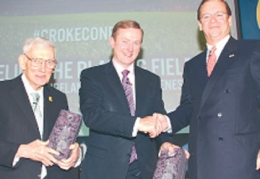Irish companies should consider establishing in new markets across the world, the president of Heinz has said.
Speaking at the annual US Embassy conference in Dublin’s Croke Park last week, Bill Johnson of the US processed food giant added that such a move was necessary if companies want to survive long in business.
“Whether your company is based in the US, Ireland or elsewhere, a strategic presence in emerging markets is increasingly critical to competing effectively in the global economy.”
Johnson’s statement is based on the enormous growth potential he sees for his own business “given that 85 per cent of the Earth’s population will live in these markets by 2015, with growing ranks of middle-class consumers.”
He also praised the efforts of the Government in tackling Ireland’s debt and deficit crisis, adding that Ireland is moving towards economic recovery.
Heinz, which currently employs over 250 people at its Dundalk factory, has invested about $80m in its Irish operation, said Johnson, adding that the company has beaten the current economic recession as it continues to grow with annual turnover nearing $100m.
According to the Heinz president, Ireland has attracted over 600 US companies that have invested more than $190bn and employ over 100,000 people thanks to many years of pro-business government policy.
Before Johnson took the podium, Taoiseach Enda Kenny told the conference – titled ‘Levelling the Playing Field: Strengthening Ireland’s Competitiveness’ – that Ireland was a leader in global competitiveness.
“The IMD World Competitiveness rankings published last week show that Ireland is now back in the world’s top 20 for competitiveness,” he said, adding that Ireland is rated “number one in the world for the availability of skilled labour; second in the world for productivity and efficiency, number one for our flexibility and adaptability when faced with new challenges; and we top the rankings on globalisation and reform.”
One of two panel discussions was on Irish competitiveness. Moderated by the conference MC, RTÉ journalist and Prime Time presenter Miriam O’Callaghan, panellists included Minister for Education Ruairi Quinn, veteran journalist and commentator Eamon Dunphy and Harmonia CEO Norah Casey.
For Dunphy, Ireland’s challenge “is to find the opportunities in a time of adversity”. With reference to the success of the Rooney Rule in the US – which mandates professional American football teams to interview candidates from an ethnic background for head coaching and senior positions, he said one can only be competitive if one is “able to get in the game”.
He urged those in authority to use affirmative action as a way of checking inequality and moving the country forward.
Casey, meanwhile, called on multinational companies in Ireland to re-invest a little bit more into the Irish economy through the creation of a super research fund. And on education and competitiveness, Minister Quinn emphasised that Ireland would be better placed in the future.
He said: “It is my intention to lay the foundation for having the most educated and the most flexible Irish citizens who can go anywhere in the world as well as stay at home and be such an attractive proposition” for attracting foreign direct investment.
The minister also noted that 25 per cent of the country’s population are currently engaged in full-time education.
Also speaking at the conference, US Ambassador to Ireland Daniel Rooney reiterated the need to adopt affirmative action in major aspects of life.
“I know adopting change and new practices can be difficult, but the rewards are significant,” he said. “I have always believed that to be truly successful everyone needs an equal chance to compete. This is true in business and it is true in sports.”
Other speakers on the day included Minister for Jobs, Enterprise and Innovation Richard Bruton, who was part of the panel discussion on ‘Redefining Business as Usual’.












